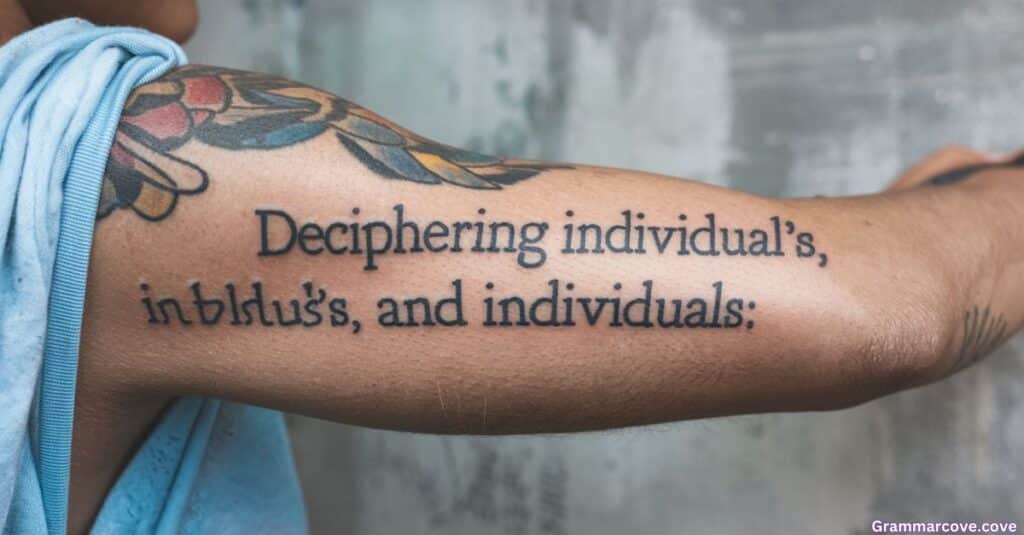
Ever caught yourself scratching your head over where to stick that pesky apostrophe? You’re not alone in this grammatical pickle. Today, we’re diving headfirst into the world of “individual’s,” “individuals’,” and plain old “individuals.” Buckle up for a wild ride through the twists and turns of English grammar!
The Lone Wolf: Individual’s (Singular Possessive)
When we’re talking about something belonging to just one person, we roll out the red carpet for the singular possessive: individual’s. It’s a cornerstone of English language mastery.
Picture this:
Jake, the new guy in accounting, shows up for his first day. His boss, Maria, fires off a quick email:
“Hey team,
Look alive! Jake’s joining us today. I’ve left the new individual’s orientation packet on his desk. Let’s make him feel at home, shall we?
Cheers,
Maria”
Here, “individual’s” is all about Jake. That orientation packet? It’s got his name written all over it.
The Wolf Pack: Individuals’ (Plural Possessive)
Now, what if we’re dealing with a whole bunch of people owning something? Enter the plural possessive: individual. It’s like the cool older sibling of the singular possessive.
Check this out:
HR honcho, Dave, is organizing the office Christmas party. He sends out this gem:
“Folks,
I need the individual secret Santa preferences ASAP. No one wants another year of Bob getting socks. Again.
Get on it,
Dave”
“Individuals'” here is talking about everyone in the office. All those gift preferences belong to the whole gang.
Just Plain Wolves: Individuals (Simple Plural)
Sometimes, we’re just talking about multiple people, no possession involved. That’s when we use the simple plural: individual.
Here’s the deal:
Project lead, Sarah, is putting together a dream team. She messages her boss:
“Hey Lisa,
I’ve got my eye on a few individualfor Project Phoenix. Mind if we pow-wow about these potential rockstars?
Sarah”
“Individuals” here is just Sarah’s way of saying “people.” No ownership, just a bunch of humans.
Possession Obsession: Nailing Down Writing Precision
Getting a grip on possession is key to clarity in writing. It’s one of those English language rules that can really level up your communication game.
The Apostrophe: Your Trusty Sidekick in Possessive Forms
The apostrophe is the unsung hero of possession. But where you plonk it down can make or break your sentence. Here’s the lowdown:
- One owner? Add ‘s (individual’s)
- Multiple owners and the word ends in s? Just add the apostrophe (individuals’)
- Multiple owners but the word doesn’t end in s? Add ‘s (children’s)
Singular or Plural? The Individual vs. Individuals Showdown
Before we even think about possession, we need to figure out if we’re talking about one person or a whole crew. This grammar clarification is crucial:
- Individual: Just one lone wolf
- Individuals: A whole pack
Let’s break it down in a table that’ll make everything crystal clear:
| Form | When to Use It | Example in Action | What’s Going On |
|---|---|---|---|
| Individual | Talking about one person | The individual aced the test. | One smart cookie |
| Individuals | Multiple people in the mix | Individuals from 10 countries attended. | International crowd |
| Individual’s | One person owns something | The individual’s phone kept ringing. | Someone needs to put that thing on silent |
| Individuals’ | Multiple people own something | The individuals’ complaints were heard. | A bunch of people weren’t happy |
This table is your secret weapon for understanding possession and nailing plurality with “individual.” It’s your ticket to writing precision and sidestepping those pesky common English mistakes.
Oops! Classic Blunders and How to Dodge Them
Even the grammar pros trip up sometimes. Let’s look at some classic common English mistakes:
- Apostrophe Chaos: “The individuals’s ideas” (Nope!) vs. “The individuals’ ideas” (Bingo!)
- The Missing Apostrophe: “The individual coat” (Wrong!) vs. “The individual’s coat” (Right on!)
- Form Fumble: “The individual idea” (Uh-uh) vs. “The individual’ idea” (Now we’re talking!)
Pro Tips for Possessive Perfection
- Say it Out Loud: Your ears might catch what your eyes miss.
- Play Detective: Always ask, “Who’s the owner here?” It’ll guide you to the right possessive form.
- Divide and Conquer: In tricky sentences, identify who owns what separately.
- Practice Makes Perfect: Like any skill, English language mastery comes with time and effort.
Real-Life Grammar in Action
Let’s see how this plays out in the wild:
Scenario 1: School Newsletter Shenanigans
“Our star pupils are shining bright! Each individual’s achievements will get a spotlight in next month’s newsletter. We’re bursting with pride over our students’ hard work!”
We’ve got both singular and plural possessives doing their thing here. “Individual’s” is about each student separately, while “students'” is giving a group hug to all the high-flyers.
Scenario 2: Courtroom Drama
“The court respects the individual’ right to privacy. However, each individual’s testimony is crucial. His Honor will ensure all individual get fair treatment.”
Look at that! All three forms in one go:
- “individuals'” (plural possessive) talking about rights belonging to many
- “individual’s” (singular possessive) focusing on each person’s testimony
- “individuals” (simple plural) referring to everyone involved
Context is King in Language Nuances
Picking between individual’s, individual’, and individuals? Context is your best friend. Check these out:
- “The individual’s vote counts.” (One person, one vote)
- “The individuals’ votes have been tallied.” (Many people, many votes)
- “Individuals often vote based on personal beliefs.” (People in general)
Each sentence paints a different picture, showing why choosing the right form matters.
Usage Examples Across Different Fields
In the Business Jungle:
“We value each individual’s unique skills. But the project’s success hinges on the individuas’ teamwork. Our goal? Creating a space where individuals can shine.
In the Halls of Academia:
“Prof. Smith evaluates each student’s work individually. The class’s overall grades soared, thanks to the students’ dedication. Our mission? Shaping individual ready to take on the world.”
In the Hospital Hustle:
“Dr. Jones reviews each patient’s case carefully. Our hospital guards patients’ privacy fiercely. We prep our staff to care for individual from all walks of life.”
Taking Your Writing from Meh to Yeah!
Knowing the rules is great, but true English language mastery is about wielding words like a pro. Try these advanced moves:
- Mix Up Your Sentences: Don’t start every sentence with “The individual’s…” Variety is the spice of life!
- Pronouns Are Your Pals: Sometimes, swapping “individual’s” or “individuals'” for “their” makes your writing smoother than butter.
- Get Specific: Why say “the individual’s report” when you can say “Sarah’s report”?
- Know Your Audience: Match your writing style to who’s reading. Formal for the boss, casual for your work bestie.
Wrapping It Up: Embracing English’s Quirks
Mastering individual’s, individuals’, and individual is just one piece of the English language mastery puzzle. These language nuances might seem tricky at first, but with practice, they’ll become second nature.
Remember, nailing writing precision isn’t just about following rules—it’s about getting your point across clearly and with style. By getting these distinctions down pat, you’re not just avoiding common English mistakes; you’re leveling up your communication game.
So, next time you’re hammering out an email or crafting a report, take a sec to think about how you’re using these forms. Are you showing ownership right? Is your meaning crystal clear? With these writing tips in your back pocket, you’ll be communicating like a pro in no time.
Language is always evolving, so stay curious and keep learning. Don’t be shy about seeking grammar clarification when you need it. Even the grammar gurus sometimes pause to ponder where that apostrophe should go. It’s all part of the wild, sometimes wacky, but always fascinating world of English. Keep at it, and soon you’ll be navigating these grammatical waters like a seasoned captain!

Steel Morgan is an experienced blogger passionate about language and writing. On Grammarcove. he shares his expertise in grammar, punctuation, and effective communication, making complex rules simple and accessible for readers. With a knack for clear explanations and engaging content, Steel aims to help others master the art of language.







